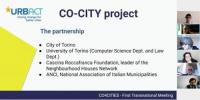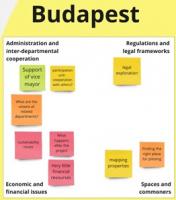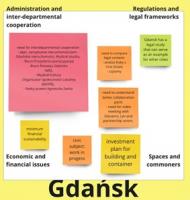
Due to the Covid-19 situation, the 1st Transnational Meeting of CO4CITIES was organised online.
Over 40 participants from the cities of Turin,. Budapest, Cluj-Napoca and Gdansk joined the meeting. As this was the first meeting between partners, the meeting was designed to create a “chemistry of cooperation” among partners and to introduce the key concepts of Turin’s good practice.
The meeting was launched by a round of greetings by CO4CITIES Lead Partner coordinator Giovanni Ferrero, Lead Expert Levente Polyák and Ad-hoc Expert Christian Iaione, as well as two guests from relevant organisations: Simone d’Antonio from the Italian National Urbact Point and Nicola Masella from the Naples Municipality, Lead Partner coordinator of the URBACT network Civic eState.

After a matchmaking moment when team members from the different partner cities could meet each other briefly and exchange thoughts, the Turin team introduced the CO-CITY and the CO4CITIES projects. This introduction focused on the objectives of CO-CITY, the partnership, the co-design and co-management mechanisms in place and the project outputs. CO4CITIES was introduced as a framework of collaborative tools for cities in urban regeneration, including the key elements of the commons regulation, the pacts of collaboration and the Neighbourhood Houses.
The final part of the Transnational Meeting’s first day was dedicated to the Neighbourhood Houses as the most tangible pillars of CO-CITY and therefore important elements of the good practice of CO4CITIES. In preparation for the Transnational Meeting, the Turin team and the experts opted for a strong focus on these spaces in order to help partners conceive the scale and importance of public-civic cooperation in the city of Turin. In order to substitute for on-site visit to the Neighbourhood Houses, the Turin team and experts prepared a series of videos as well as two virtual visits with the help of local protagonists in Turin. In this way, with a local “reporter” on site, all partners could have an insight into Cascina Roccafranca, the first Neighbourhood House, and Via Cumiana 15, the last space in the network.

The Transnational Meeting’s second day focused on Turin’s Urban Commons Regulation and invited partners to share their preliminary visions for the transfer. In the morning, the commons regulation was presented, helping partners to explore the regulation as a means to involve citizens not only in sharing their opinions but also to act and take care of urban assets. The Commons Regulation was also discussed as a way to rethink the role of the public administration, from service provider to enabler and partner.
Besides the legal principles and tools provided by the Commons Regulation, the Turin team also presented the necessary underlying administrative infrastructure. The sustainability-related challenges of the regulation and the Neighbourhood Houses were also discussed in the session, as well as dilemmas and ideas for Turin’s Springboard Plan.

After feedback and questions from partners, the meeting continued with the preliminary transfer visions of each partner city. The Gdansk team presented their ideas to improve a social housing complex with community functions and to rethink a public building as a new Social Cohesion Centre.
Cluj-Napoca explored the possibilities of establishing a Youth Centre in a municipal space that would help youth groups manage the space and develop volunteering projects and business ideas. Budapest explored a variety of scenarios of using vacant public properties to run co-managed venues with citizen groups and NGOs.
The first Transnational Meeting continued with a series of interactive exercises using MIRO boards. Partner cities, gathering in breakout rooms, could use the moment to develop further their transfer vision and continue the stakeholder and problem mapping exercises started at the programme level kick-off meeting. The meeting concluded with an overview of the next steps and planning the bilateral visits and upcoming meetings.



